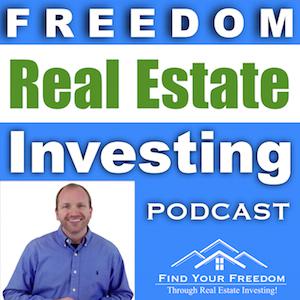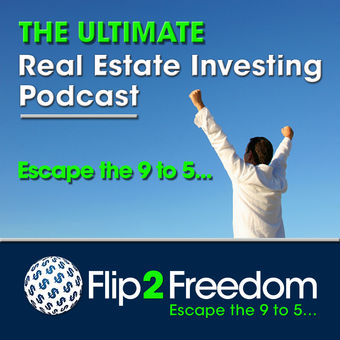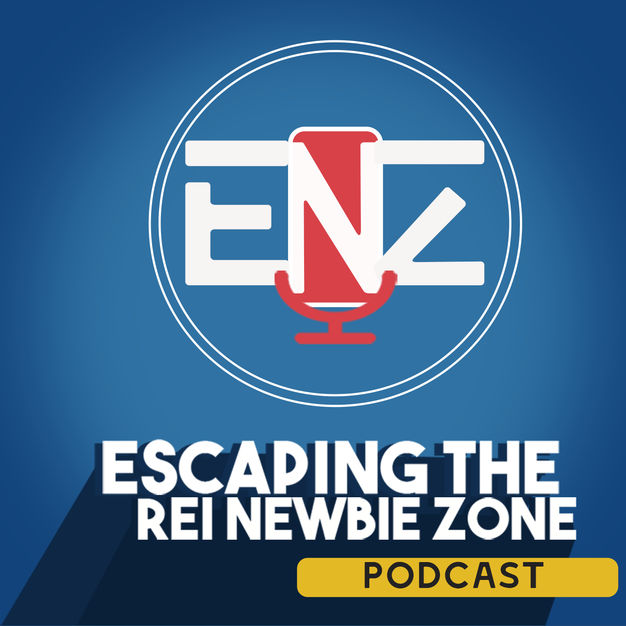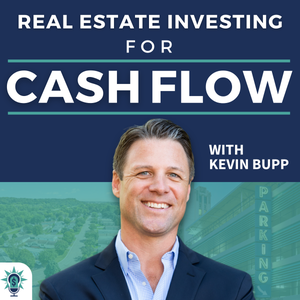
Real Estate Investing For Real Estate Investors
REIClub.com
Learn to invest in real estate and make wise real estate investments with REIClub.com, a real estate investing website for real estate investors by real estate investors.
- 35 minutesWholesaling Beginner Blues (Michael McDonald)
I have to confess that I'm guilty of this.
Wholesaling houses is often presented as the easiest way to get into real estate investing.
Sure it doesn't require much capital and it can generate incredible profits.
But the truth is that for beginners, wholesaling can be tough, scary, and even a little intimidating.
Michael McDonald started wholesaling a few years ago in a small midwest market, but he's grown that into a team that does deals all across the country.
What I loved about interviewing Michael was his openness to share his struggles (5 months of prospecting with 0 deals) and how he got through the struggles and on to closing 6 deals in the next 6 months.
⏰ TIME STAMPS ⏰
00:50 Michael McDonald Gets into Wholesaling
02:15 Experience with Real Estate Gurus
03:07 Investing in Real Estate Education
05:51 Breaking Your Own Beliefs
08:06 Maxing Out Credit Cards for Education
09:50 When to Quit Your 9-5
12:07 From Solo-Preneur to Partner
14:03 What Makes for a Good Partnership?
17:21 Going from Doing to Managing
19:06 Learning Leadership on the Job
21:30 How to Hire for Real Estate Investors
23:19 What KPIs Matter in Wholesaling Real Estate
26:04 The Best Marketing for Motivated Sellers
29:20 The Reality of Wholesaling Real Estate
21 September 2023, 12:42 am - 32 minutes 39 secondsDo You REALLY Need a Permit? (Justin Dossey)
When you're flipping a house, do you REALLY need to pull a permit?
On Justin's first flip he didn't pull a permit and tried to do his renovations quickly, which makes for a great story for us to learn from. Let's just say his answer to the age old question has flipped around since that deal.
Justin is the head of Ballpoint Marketing and Call Porter, two companies they use in their own real estate investing businesses (operating in multiple states) that you can put to work in your business as well.
Ballpoint Marketing - Handwritten (by robots) direct mailing service for real estate investors https://reiclub.com/Ballpoint
CallPorter - US based call answering service for handling inbound phone calls from motivated sellers https://reiclub.com/CallPorter
⏰ TIME STAMPS ⏰
00:00 Justin Dossey - Ballpoint Marketing
00:45 Call Porter & Ballpoint Marketing
02:00 Why Direct Mail Is Coming Back
05:00 Omnipresent Marketing
06:30 Adding value BEFORE the sale
07:12 Relational Sales vs Hard Push Sales
08:42 Big Data & Direct Mail Response Rates
11:52 Flipping Condos
16:36 What NOT to do in Real Estate
20:40 Should you pull a building permit?
22:02 Direct Mail + Inbound Call handlers
25:09 Real Estate Investing Challenges
29:18 The Obstacle Is The Way
Watch This Video on REIClub.com:
https://reiclub.com/real-estate-podcasts/flipping-houses-need-a-permit
27 July 2023, 5:52 pm - 31 minutes 8 secondsLove Yourself Like Your Dog (Brad Chandler)
Brad Chandler knew he never wanted to work for someone else, so when an investor flipped Brad's neighbor's house he saw the potential. So every night after putting his son to bed Brad would place bandit signs and hand address envelopes to find his first deal. After a few months he still didn't have a deal, but he stayed persistent and after 8 months of searching he landed 6 deals and quit his job.
That's when a few tips from his real estate mentors helped him take off. From "We Buy Houses" signs in every front yard, to advertising deals as "Handyman Specials" (from Ron LeGrand's cassette tapes) Brad's marketing machine began to pick up steam.
Then one day Brad was working with a coach for his son, when the coach noticed that Brad had a nervous tic when recalling his childhood memories. That's what started Brad on the pursuit of happiness, which took him back to his childhood to confront some of the traumas he faced. It turns out the secret to happiness is exploring your subconscious mind and learning to control the thoughts that it spews out.
But when Brad looked around, he saw a lack of self-love everywhere he went. Alcohol abuse, drug addiction, and failing marriages are some of symptoms of subconscious unhappiness. So Brad set out on a mission to help every entrepreneur learn to love themselves and be happier. So join his Facebook Group and take his 60-Second Self-Love quiz with the links below.
The 60-Second Self-Love Quiz https://bradchandler.com/love
How to Be Happier (for Entrepreneurs) Facebook Group https://www.facebook.com/groups/howtobehappy/
⏰ TIME STAMPS ⏰
00:00 Brad Chandler - Real Estate Investor
03:20 Dead End Job
04:30 First Deal
05:40 Real Estate Mentors
07:10 Ron Legrand Cassette Tapes
08:45 Ask This Question
10:10 Scaling Up
12:30 Implementing E-Myth
13:40 Money Pits
15:45 Childhood Programming
17:40 Subconscious Unhappiness
19:07 Brad's Mission
23:15 Happy Childhood
26:15 Fight or Flight and Creativity
19 July 2023, 10:00 am - 37 minutes 31 secondsDark Side of Real Estate Investing (Tony Javier)
What are the pros and cons (or downsides) of real estate investing?
The pros of real estate investing are pretty well known, the ability to use leverage (debt) to buy properties that generate passive income (cashflow) that also appreciate in value (equity) while giving tax benefits (depreciation).
But every investment has its cons, some of real estate's downsides are market volatility, bad tenants, vacancies, maintenance, and legal/regulatory issues. Basically it comes down to tenants, toilets, and termites.
Tony Javier's career as a real estate investor was almost derailed by those downsides. Luckily he didn't listen to the naysayers and dove right in, acquiring 10 rental properties in just a few years using the BRRRR method.
⏰ TIME STAMPS ⏰
00:00 Tony Javier - Real Estate Investor TV consultant
01:00 Carleton Sheets - Real Estate Infomercial
02:03 BRRRR Method Success
04:57 Dropping out of College
06:30 Toilets & Tenants
07:35 Worst Deal
17:06 TV ads for Real Estate Investors
22:00 Founding 10X TV
25:30 TV ads in big vs midsize markets
29:18 TV vs Direct Mail
32:49 Why 10X TV?
17 July 2023, 7:40 pm - 50 minutes 32 secondsRed Flags & Real Estate Scams (Dean Rogers)
Scammers are just a part of life, but Dean Rogers learned how to do 'deeper' due diligence after he got burned by a known criminal. Dean lost $180,000 but sees how he could have avoided it by trusting his gut and making a few more phone calls to other people involved in the deal.
Con-men (and Con-women) know that most people want to trust other people, and they abuse that trust to scam people. To avoid scams in real estate (or anywhere) just remember this quote:
"Trust, but verify." - Ronald Reagan
⏰ TIME STAMPS ⏰
00:00 Dean Rogers - Real Estate Investor
01:43 Football Career & NFL Signing
09:54 Deciding to Retire
15:30 Corporate Life Letdown
16:20 Getting First Wholesale Deal
22:19 Real Estate Investing 101
23:47 Co-Wholesaling to Going Solo
28:08 Real Estate Due Diligence
29:31 Red Flags & Real Estate Scams
38:02 How to Expose the Scammer
45:00 The Deal Champs Podcast
30 June 2023, 7:14 pm - 24 minutes 34 secondsMake Your Rules & Reduce Your Risk (John Jackson)
As someone who embraced legal lease options in Texas, John took advantage of the opportunity the regulation created. From working with one or two FSBO sellers to eventually scaling up and moving hundreds of properties every year, John was named the King of Lease Options by Joe McCall himself.
But all of that business success set John up for some painful failures, so John thought back to his time as a stock trader came up with these 3 rules to live by.
- Your ego ain't your amigo - When entrepreneurs hit the Million dollar mark in gross revenue, it's a dangerous place. The success builds the ego, the ego underestimates risk, and the risk breaks down the ego.
- Gross doesn't buy groceries - Tracking your gross revenue is almost pointless, because it's the profit the business generates that actually matters.
- It's OK to make a mistake ONCE - Every mistake should teach you a lesson, learn the lesson and create a rule to prevent yourself from repeating the mistake.
⏰ KEY MOMENTS ⏰
00:00 John Jackson - Lease Options / Rent to Own Houses
01:00 Joe McCall names John the King of Lease Options
03:20 John Jackson & Joe McCall & Naked-Investor.com
04:46 Lease Options Explained
06:02 Are Lease Options Legal in Texas?
07:43 Downloadable Free Real Estate Contract PDF
08:30 John Gets His First Lease Option Contract
12:34 Creative DIY Bandit Signs
14:07 Sandwich Lease Options Explained
15:02 #1 Person You DON'T Want to be in Real Estate
16:53 Don't Break the Rules of Real Estate
18:31 Roadmap for Scaling a Business
20:05 Russ Whitney's Real Estate Training Business
21:47 KPIs & Gross Doesn't Buy Groceries
21 June 2023, 4:47 pm - 20 minutes 3 secondsHey Wholesalers, Shut Up! (Noah Gilliom)
The #1 thing wholesalers need to do is shut up and LISTEN!
Sorry if that sounds harsh, but most wholesalers usually race to the contract instead of being quiet, listening, and building an actual relationship. We all know "The fortune is in the follow-up", but most wholesalers call their sellers to "check-in" or "follow-up" and sound like a stereotypical salesperson. 🤮
When you listen to your potential sellers' problems, it makes following up so much easier. It takes more time, but that will pull out the seller's motivation and help you to make sure you address their problems and find the win-win solution for both parties.
Noah Gilliom trains his real estate wholesaling team to focus on listening, connecting, and following-up. That's how they've increased the amount of deals they're doing from the same marketing budget, getting contracts from an average of 2-6 weeks after their initial contact.
PS: Converting more of your cold calling leads is a pure increase in PROFIT, because you've already paid for the motivated seller lead.
00:00 #1 Mistake wholesalers make
01:30 Noah Gilliom on getting started wholesaling real estate
06:43 Beating "Analysis Paralysis"
08:08 Flipping a Mobile Home / foundation issues
11:18 Lessons learn from the Mobile Home money pit
12:37 Ballpoint Marketing and Direct Mail for Real Estate Investors
13:01 CallPorter the answering service for real estate investors
15:25 How Wholesalers can follow up with motivated sellers
17:09 How long you should follow up with a seller
13 June 2023, 1:18 am - 49 minutes 36 secondsHow Rich People Cheat (We Should Too)
You don't get rich working a 9-5 because that game is rigged. Rich people don't play that game. We all know that investing in real estate is a great way to build wealth, but to ensure you keep as much of that wealth as possible you need to cheat. What the wealthy do is 100% legal, but it feels like a cheatcode because it helps them avoid the #1 wealth destroyer. TAXES. Real estate investing comes with a bunch of tax breaks and incentives, but Ryan & Cashflow Tactics have found a way to take it to the next level of tax minimization. Learn how rich people cheat with their overfunded cash-value life insurance policies.
5 June 2023, 9:46 pm - 28 minutes 29 secondsRay Zhang is the American Dream 🇺🇸
Immigrant. Homeless. Determined. Successful.
Ray Zhang achieved The American Dream for himself and his family through hard work, persistence, and real estate investing.
Ray moved to America back in 2012 and while he landed in paradise, his life wasn't smooth sailing by any means. He became homeless quickly, but through his persistence he was able to start flipping & reselling furniture & cars to get by. With that kind of work ethic, it shouldn't be a surprise that once Ray got into real estate he made six figures on his first 2 deals.
After this episode, you'll see that the American Dream is alive and well!
Chapters
00:00 Ray Zhang Real Estate Investor
05:58 Double Negotiation, Hidden Dragon
08:40 Ray's 2nd Deal makes Six Figures
10:18 Ray's Worst Land Deal
14:21 The 2 Ways Land Makes Money
17:05 What Ray Loves About America 🇺🇸
24:40 Negotiation Secrets for Introverts
25 May 2023, 12:15 am - 21 minutes 27 secondsHire & Fire These 2 People TODAY! (Bob Lachance)
Growing up Bob Lachance had one goal, to play professional ice hockey.
So in the summers Bob worked as a go-fer in his family's construction company (Going for lumber, or screws, or coffee.) While he didn't go into the family business, it did plant the Real Estate Bug in the back of his mind while he was doing this...
But hockey careers don't last forever, so eventually Bob had to start thinking about his next career. As he thought about his options, he realized real estate had a high earning potential with low barriers to entry. So he dove right in.
This is the story of how Bob found out who he had to hire and fire to be successful.
Key Moments
02:09 Growing Up as a Construction Go-fer
03:16 Leaving college to play pro hockey
04:32 Landing his first deal without the internet
06:15 Beating Analysis Paralysis
07:16 The Big Challenge of Real Estate
07:55 Buying Preforeclosure / Short Sale Properties
08:10 The FIRST Person to FIRE In Your Business
09:50 Losing 150k Next Door to Regis Philbin
12:44 Using VAs for Real Estate Investing
14:48 How REVA Global was Started
16:11 The FIRST Person to HIRE
15 May 2023, 8:26 pm - 20 minutes 46 secondsDude, Where's My House? (Jimmy Vreeland)
Jimmy Vreeland went from being an active duty Army Ranger (thanks for your service Jimmy!), to concentrating on building passive income thanks to Robert Kiyosaki's little purple book. His first deal wasn't a home run at first, but the longer he held it the more he realized it was turning into a grand slam.
And that's what he loves about real estate, as a long-term asset it's almost impossible to screw up. You just need to buy at a decent price and hold on to the property.
And if you think that's exaggerating, Jimmy actually forgot he owned a house but held onto it long enough that he still made money on it.
Resources Mentioned In The Video:
========================
Want to learn how to combine the VAULT life insurance strategy with Real Estate investing?
https://reiclub.com/cashflowtactics
Rich Dad Poor Dad - Robert Kiyosaki
https://www.amazon.com/Rich-Dad-Poor-Teach-Middle/dp/1612681123
Rich Dad's Conspiracy of the Rich: The 8 New Rules of Money - Robert Kiyosaki
https://www.amazon.com/Rich-Dads-Conspiracy-Rules-Money/dp/0446559806
⏰ Key Moments in this Episode ⏰
========================
00:00 Jimmy Vreeland - Real estate investor
02:00 Secrets the Wealthy Use To Print Money
03:15 "Throwing Darts at the MLS"
04:28 Newbies Survive the Great Recession
06:30 2 Huge Mistakes in Real Estate
08:40 The 4 Ways to Win in Real Estate
10:36 Forgetting You Own a House
12:27 CashFlow Tactics & Turn-Key Rentals
14:36 The VAULT & Velocity of Money
16:10 How Politicians Create Wealth
18:34 Interest Rates Doubled, Asset Prices Tripled?
Transcript
Jimmy Vreeland: I forgot about a house I owned. I literally forgot about it. was still paying the mortgage, but didn't, was not, it wasn't in my property management software. I did. Wasn't in my mind that I owned this house. I drove by it like every day too. George Uno: Hey guys, this is George Uno from REIClub. Thank you so much for joining me again for another episode of First and Worst. Now today my guest is a guy who went off to West Point then he got deployed overseas, Iraq and Afghanistan serving our country. And he actually read the little purple book over there overseas and got into his mind, hey that passive income sounds really good compared to what I'm doing right now. So while he was still on active duty, he started building up that passive income, and from there things just snowballed and took off. And before he knew it he was, you know, had 60 doors of his own and was like, wow, this is amazing. but Jimmy, let's get to know you man. How are you doing over there in St. Louis? Jimmy Vreeland: Good , how you doing, man? George Uno: I'm doing great. So how many deals you guys have going on right now? Jimmy Vreeland: so, we'll, we'll do 120 turnkey, and we'll do around a hundred wholesale this year. So we got 20 to 25 deals going on at any given time. George Uno: That's crazy. All right, well so that's probably a lot to manage so I don't wanna keep you too long, but take us back. Take us back. So you're in Afghanistan, or sorry, Iraq. You read Rich Dad, poor Dad. And how does that change the way you're looking at life and, and planning for things? Jimmy Vreeland: Growing up, I thought the only way you could become wealthy was to be like to be famous. So, you know, maybe politician, I realized with my mouth and my time in the military politician was out. Actor I'm not pretty enough to do that. And then athlete, which is what I really wanted to be, but not talented enough for that. So I was just like, oh, you know, I'm just gonna live this like nice life, you know definitely not gonna be wealthy. But then Rich Dad, poor dad opened me up to the fact that hey, the wealthy don't work for money. The, you know, the wealthy create and think and buy assets. They don't trade their time, they buy assets and then their assets buy, essentially buy their time back. So that was like paradigm shifting for me. George Uno: Yeah, that's crazy. I mean it's just funny that that's, everybody kind of gets that mind shift out of that book and so many investors have read that book and was their catalyst. You read the book, you say, okay, assets are what it's all about. So how do you decide on real estate and what, where'd you go from there? Jimmy Vreeland: And then I, I think I went home for leave and so Kiyosaki, I don't know how my mom actually sent me the book. I don't know how my mom found the book. I'm assuming it was when he was on Oprah. I'd have to ask her. But, so she knew about Kiyosaki, she wanted to get in on this, and then my brother was in medical school at the same time. Then he read it and he is like, yeah, let's get in on this. And I'll never forget this. So you know, interest rates were like at six and I'll never forget my mom being like, interest rates will never be this low, we gotta buy now. And they were at like six and a half 🤣. So so, you know, we started doing what everybody does. We started looking on the mls, we started walking houses. (03:21) We didn't know what we were doing. but you know, this was like in retrospect, this is 2006. This was the worst time to be buying. Worst time to be buy flipping, not worst time to be buying. I think when you're buying a long term assets and all the time's a good time to be buying. But we can get into that later. So yeah, we bought a rental house and then my brother lived in there and was a tenant for us through med school. And then he got two other med school students. So we got like elevated rent. It was like a, it was like an Airbnb before they were invented. George Uno: Wow. Pioneering. Okay, so you got it. It was, it was a duplex then? Jimmy Vreeland: Single family. But we charge rent by the room. George Uno: Nice. Yeah, that's the way to do it. So obviously in a college town near the med school Jimmy Vreeland: In St. Louis. So they're St. Louis University, not exactly a college town. yeah, but like for these med students, they're a little older. They want a yard, they want stuff like that. They wanna be able to barbecue. They don't wanna live in a dorm. George Uno: Right. Yeah. The the days of Top Ramen are over for them. That's really cool. okay, so take us through it. It did, you bought it a good, a decent time. I mean, cuz it's a long-term asset, but how did things play out through the great recession with you guys? Jimmy Vreeland: No change no effect. Like the asset value might have died down, but we had a 30 year fixed loan on it, so is irrelevant. And then what has been awesome is the Fed has continued to create, print money and so we've continued to raise rents now for the last 13 years as inflation has taken its effect. George Uno: All right. What was your cash flow on that? I mean, that's what survived through the great recession for you. You guys didn't run outta liquidity or anything, right? Jimmy Vreeland: Yeah, we had two other partners on the deal. So, you know, that was the frustrating part in the beginning it was like 200 bucks, divided it by three. You're not exactly getting passive income equals your expensive like Kiyosaki says. George Uno: Right? Right. But but it worked out. And then what'd you guys end up doing with it? I, I know you have some, you guys said it kind of snowballed from that one rental. Jimmy Vreeland: We sold it and bought a lake condo for it, but then the last two years with the, we were getting offers we couldn't refuse and so we 1031 into a condo at in Branson and then we were getting offers we couldn't refuse. We made like a hundred grand and we 1031 it back to a nicer four family in St. Louis, like a, a straight up wealth builder for my family. George Uno: Wow. Now what's that? What's that fourplex look like? What's it worth now and what's it cash flowing? Jimmy Vreeland: I think it's worth three and some change. And I bet you we make 1500 bucks a month, George Uno: Man, that's, that's quite the snowball Jimmy Vreeland: There's one thing you have to do to look like a genius in real estate. George Uno: What's that? Jimmy Vreeland: Do it for 10 years. George Uno: Be patient. Huh? Jimmy Vreeland: If you do it for 10 years, you'll look like a genius. Doesn't matter what happens. Doesn't matter what tenants do to the house. Doesn't matter. George Uno: Huh? So it doesn't matter what happens with the house, why? I think you have some kind of story about a house that that kind of got maybe, maybe fell through the cracks or something Jimmy Vreeland: You know, I made a lot of mistakes in real estate. Do you wanna, so two huge mistakes I've made in real estate is one, buying assets based off the performer of the first year pro-forma, like buying and selling based off, that was a horrible mistake I've made in real estate. We can get into that too, but I mean, I have, I forgot about a house I owned, I literally forgot about it. was still paying the mortgage but didn't, was not, it wasn't in my property management software. I did, wasn't in my mind that I owned this house. I drove by it like every day too. George Uno: Well, okay, so take us back to that. Why, why is it a mistake to look at the pro-formas for the first year of a, of a house and then sell it based on that value? Jimmy Vreeland: It's, I call it like the cashflow paradox. Like when you really need it and you're white knuckling your cashflow, y you won't get it. Like something the tenant karma will come to you for your worrying. A tenant will smash something, something will break. But then the, the most chill people who don't need the cash flow, don't care about the cash flow, get it all the time. There's no scientific statement around that. It's just, it's what I've observed. George Uno: So basically like you look at the first year, that's not a good predictor of how that rental's gonna pencil out in three or five or 10 years. Jimmy Vreeland: Nope. George Uno: Okay. That's been your experience. Jimmy Vreeland: So I see a lot of people looking at pro-formas for like, I call 'em Excel millionaires. Like one of the, when I started doing this on my own, I bought a four family for like $80,000 and like each unit rented out at 500 bucks. Right? So I'm like, wow, that's two grand in gross rent and my mortgage is like 400 bucks and you know, I should be cash flowing a thousand bucks every month. And like, so the pro-forma looks awesome. The proforma didn't mention it was in the ghetto. The pro-forma didn't mention it was not a good long term asset. The pro-forma didn't mention any of that. It just said year one you're gonna crush. And we didn't crush because we were chasing rent the whole time. George Uno: Oh, okay. So there's more to it than just the numbers. You know, there's kind of that subjective aspect is that what you think is important? Jimmy Vreeland: Like in real estate you win in four ways. So it's really hard to lose. Like you when you, it doesn't, like we talked about my first deal, right? Essentially me, my brother and mom were throwing darts at the MLS, as as we didn't buy something that was massively overpriced. There's no way we would've lost, don't touch the stock market cuz it's so boring. It's like all you can do is buy low and sell high. Like, I don't play a game where I can only win one way. That's like, that's like football before the invention of the forward pass. I, I like playing games where you win multiple ways. Like I love it that a single family asset will keep up with the stock market with appreciation. Then I love that cashflow from a rental property. Like I buy rentals right now to lower my taxes. I love it that I get to collect assets and it lowers my tax liability and then the ability to use leverage. I love it that I borrow money from a bank and I borrow it for 30 years and on years 15 through 30 I'm because of inflation, I'm giving the bank back garbage dollars. George Uno: No, when you put it like that, I mean, you're totally right. We see that now, you're paying back inflated dollars on a fixed mortgage. Jimmy Vreeland: Right, like, but I am collecting more garbage dollars in rent and my cashflow is that ca that delta between a fixed cost of capital and increasing rents. Like that's, that's when the cashflow hits. It's not the first 12 months because I used to whiteknuckle it, I'd be like, oh, I just added the pro-forma said 200 bucks. So I'm 200 bucks closer to quitting my job. Like that's not, that's when the assets are leveraged. It's, it's just not gonna happen. George Uno: What's the fourth way to win Jimmy Vreeland: Taxes, Leverage, Cashflow and Appreciation. George Uno: Right? Okay. Yeah. So we touched those. Okay. so tell us about that house you forgot because obviously that's a giant mistake, huge oversight, but how did that end? Like what was the, what happened there? Jimmy Vreeland: So the reason it happened is we were moving offices and the, the leasing agent who took the deposit didn't get it into the software. And when we were moving. And turns out these were horrible tenants, these tenants spent like six, seven months there just tearing it in half. So I, the county called me was like, you own this derelict house. I'm like, no I don't. And they're like, yeah, you do. And I'm like, oh, I actually do, there's like $30,000 in damages here. Like I can't do this right now. So what did I do? I bet on this was probably, this is 2018, I bet on the market saving me. And I just sat on the house for two years and I eventually made, I think I made 20 grand off it. I gambled that I won. I would not recommend that to anyone George Uno: But it's nice. It's nice you bought a good asset at a good price and the market saved you, which you can't always count on. Jimmy Vreeland: Like, it, it's not, I could not buy a book about, hey, forget your houses and grow wealthy. George Uno: That that sounds too good to be true almost. Jimmy Vreeland: I mean I bought the, I mean I did buy the house for 30 grand with the covid kick up with the market going crazy. It eventually appreciated to 60k. George Uno: With no work... Jimmy Vreeland: With rehab. I bet you it's worth 180. George Uno: That's pretty good. That's pretty good for for a forgotten house. (12:21) So Jimmy, what do you guys got going on today? I heard you guys just crossed a big milestone with your students. Jimmy Vreeland: We got our education platform cashflow tactics where we talk about the four ways to win and we show people, you know, all the financial jiujitsu you can do when you're buying assets, where you win four ways. So we show people how to acquire turnkey assets and how to add it to their financial plan. And we have you know, our community's bought over 2000 houses, so we just crossed that they're getting a million. The community's collectively getting a million dollars in cashflow now. George Uno: That's crazy. And you guys are, you guys are buying these assets in the Midwest and flipping 'em and selling 'em his turnkey rentals. That just makes a lot of sense for people who don't, you know, I heard you were on a podcast and the guy was like, why didn't you get into wholesaling right away? And you were like, well I had, you know, I wasn't ready to make that full-time dive. I didn't wanna be actively investing. And for a lot of people that's kind of where they're at, right? They have a lot of income, they have a good job, they don't feel that need to quit right away. So this is a, you find this like, to be a safe and easy way for them to start building that snowball. Jimmy Vreeland: It's the, it's the best way. I don't know of a better asset out there that can do all that a single family house can do for you. George Uno: Yeah. And what's the typical process for, for taking these people who are, you know, busy professionals and how do you guys get them into real estate and what does that process look like? Jimmy Vreeland: You sign up for our, our course you know, it's like a 15 video course to kind of explain the basics to you. Then we have weekly calls cuz it, it, it sounds silly, but to buy a house, you know, I'm trying to think for me buy reading Rich Dad, poor Dad to actually buying a house, walking a hundred deals, all that type of stuff. It took like probably two years. So we're able to shorten that timeline down really to 60 to 90 days for people, and give 'em enough education to kind of be dangerous and start learning. We also hooked them up with a financial instrument called the Vault probably outside the scope of this podcast. Basically we get 'em pre-approved by a bank and once they say, Hey, I'm ready to buy, then we just start showing 'em deals. George Uno: So you mentioned the the vault. Can you tell us how you guys are, are teaching your students to use the vault and what it does to their returns, their ROI. Jimmy Vreeland: You know, when you first read Rich Dad Poor Dad and you know, another great Kiyosaki book is The Conspiracy the Rich, and you're like, wait a minute, the wealthy seem to be claimed by a different set of rules. And you get exposed to that and it it, it pisses you off a little bit, quite frankly, right? And so when I discovered the vault, it really pissed me off because everyone who's wealthy has these assets and no one talks about it. So the vault's essentially a, a whole life insurance policy and people are like whole life insurance policy that's so boring. Like whole life is like the backbone of, of the economy. Like all liquidity is stored in life with life insurance companies. You could make a, probably outside the scope of this podcast, you could make an argument that life insurance companies in 2008 crash kept the economy solvent because they had liquidity. They were, you had drug dealers and you had life insurance companies who were providing liquidity to the economy. George Uno: Yeah. So you're talking about cash value life insurance, right? Jimmy Vreeland: We teach a strategy that you put your money in a whole life policy, you get a 5% tax free return. So 5% tax free is really an 8%. Then you borrow against that life insurance policy for your down payment of the house. So you're still getting 5% tax free the return. And then if you look at a single family asset, generally you get a 30% internal rate of return. So we're just showing our students how to increase the velocity of their dollars. George Uno: Wow, that's, I need to do that because I've got some deals I wanna do, but you know, I don't wanna just spend the cash that it's gone forever, right? With these cash value it sits there, you borrow against it and it keeps compounding. Is that right? Jimmy Vreeland: So the cash is working in two assets at the same time. George Uno: That's yeah, that does seem like a different set of rules for sure. Jimmy Vreeland: And if you look at like every politician, if you look at their tax return, they all have massive amounts of cash in these policies. George Uno: How fast can you get your students from not having one of these to getting it set up and ready to deploy the capital. Jimmy Vreeland: 90 days. George Uno: Just a 90 day seasoning. That's it. Jimmy Vreeland: Day one, let's say I put a hundred grand into a vault day one, 80% of it's liquid it can be borrowed against. George Uno: Okay. I actually need to come and talk to you guys because this is perfect for me right now. Jimmy Vreeland: Yeah, it is. Ryan will set you up a vault. George Uno: Cool man. Well Jimmy, thanks so much. do you have any part and words for our audience, any advice you wanna give them? Somebody who's, you know, kind of been looking at that house kind of been, you know, throwing some darts at the market but not not quite ready to go. Is this a good time to buy or is this kind of, should we be all be sitting on the sidelines a little bit scared Jimmy Vreeland: Every, my philosophy is it's always a good time to buy. Your reasons are just gonna change. Now is the time to buy because deals are opening up. Like, so the turnkey deals, like for me to find turn, like I'll never forget I was at the collective genius with Lee , spring of 2021, you know when the market was just red hot, right? And everybody was like crushing on flips and like I was having trouble with deal flow and he was like, Jimmy, that's because turnkey is great when it's hard to find buyers. It's not hard to find buyers right now. So there were, there were few and far between on deals on turnkey and then all the students, guess what their main complaint was? Deals. And so right now we're like in this perfect spot where at least in the Midwest, prices aren't dropping but deals are opening up. (17:56) And so now you can get that like better three, two asset that you couldn't necessarily get the last two years. And then, you know, if people are like, Hey, I'm gonna wait till interest rates will go down to start buying, it won't work because soon as rates go down, the funds are coming back in and taking everybody's opportunity. The play right now is to buy a great asset that is going to benefit from inflation and you're gonna get your cash flow from the inflation even at a high interest rate. And then when interest rates dropped, refi 'em amount. George Uno: Yeah, that's super smart. You're locking in that purchase price right now and the deals are kind of, kind of coming online, Jimmy Vreeland: Locking in your, because of inflation prices are leveling but rents are rising. So you're locking in that leveled up price. And you know, I learned fun history fact in the late seventies when interest rates doubled, you would've accept, you would've thought the real estate market would've taken a bath, right? Rates doubled, asset prices tripled. George Uno: That doesn't make any sense based on what everybody's saying right now, but I'm gonna have to go check that out. Jimmy Vreeland: Econ 101, you would think, hey, cost of capital's up so demand will go down, right? Yes. Demand has gone down, but two years ago or a year ago, we had an insatiable demand. There was no inventory to supply all the demand. Right? And so now yeah, demand's low, but it's not low enough that inventory's sitting. George Uno: Yeah, that's true. I mean we're just seeing like you know, a little drop in prices, a little increase in days on market, but nothing, nothing crazy, Jimmy Vreeland: Right? And so the other, the way I can explain why prices tripled when rates doubled is because why did rates double? Because they were in inflationary period. Where do people flock to an inflationary period? Hard assets. George Uno: Yeah, I mean there was a huge lag before we even saw the first price decreases after the interest rates started going up. Cuz you know, investors are watching the numbers straight from the Fed and homeowners are still looking at their Zestimate, you know, in two different worlds, two different, you know, timelines. Very cool. All right, well don't sit on the sidelines in 2023 guys. That's what Jimmy's saying. Jimmy Vreeland: Yeah. If you wanna sit on the sidelines at 2023, just expect to sit on the sidelines for 2024 and 2025 cuz there won't be deals. George Uno: Yeah. It's gonna be impossible to time that, that shift when the, as soon as the rates drop, you're just not, you're gonna miss it guys. You just will. So Jimmy, thanks so much for all that wisdom, man. You are, you guys are crushing it over there. A million dollars in passive cashflow for your students. That's gotta feel amazing. You're changing a ton of lives and I'm gonna be reaching out about that vault cuz man, I need one of those right now for sure. Jimmy Vreeland: Sounds good, bro. George Uno: All right guys, it's George Uno with REIClub, Jimmy Vreeland with Cashflow Tactics. I'll catch you guys on the next episode. You guys can check out Jimmy at REIClub.com/cashflowtactics. Talk to you guys soon. See you later.8 May 2023, 9:15 pm - More Episodes? Get the App
 Freedom Real Estate Investing
Freedom Real Estate Investing
 The Ultimate Real Estate Investing Podcast | Make Money in Real Estate Wholesaling or Flipping Houses
The Ultimate Real Estate Investing Podcast | Make Money in Real Estate Wholesaling or Flipping Houses
 America‘s Commercial Real Estate Show
America‘s Commercial Real Estate Show
 Real Estate Investing Mastery Podcast
Real Estate Investing Mastery Podcast
 Escaping The Real Estate Investing Newbie Zone - Make Money In Real Estate Wholesaling Properties For Quick Cash
Escaping The Real Estate Investing Newbie Zone - Make Money In Real Estate Wholesaling Properties For Quick Cash
 Real Estate Investing for Cash Flow with Kevin Bupp
Real Estate Investing for Cash Flow with Kevin Bupp
Your feedback is valuable to us. Should you encounter any bugs, glitches, lack of functionality or other problems, please email us on [email protected] or join Moon.FM Telegram Group where you can talk directly to the dev team who are happy to answer any queries.